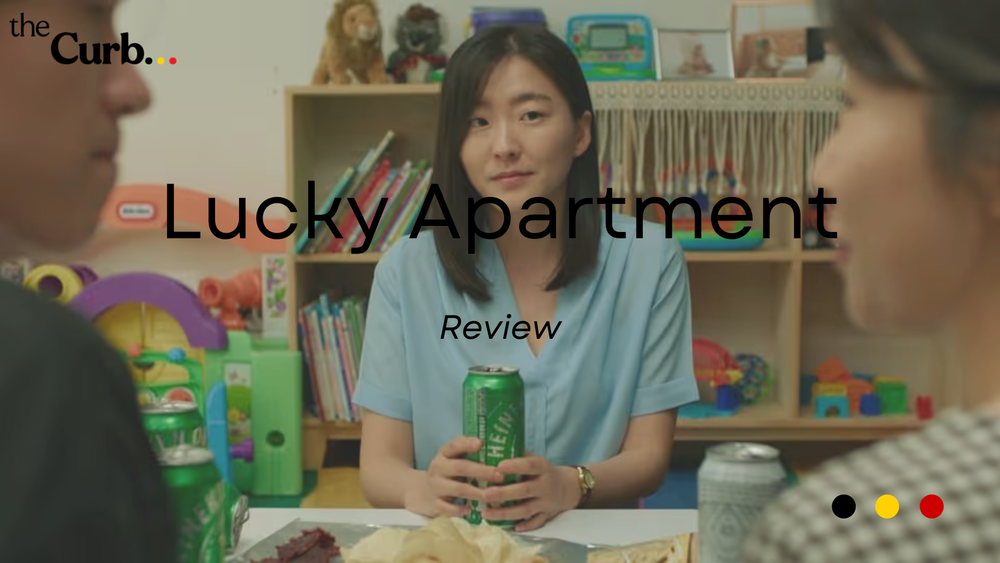South Korean documentarian Kangyu Garam makes her feature-length debut with Lucky, Apartment, a film that feels both intimate and unsettling in the way it threads the ordinary with the unbearable. At its core, the film explores queer life in Seoul not through the triumphant rhetoric of visibility, but through the persistence of invisibility—what is hidden, ignored, or deemed inconvenient in a society still resistant to recognising queer existence.
The story follows Sun-woo and Hee-seo, two women in their early thirties who have been together for nearly a decade. They live in a cramped apartment on the outskirts of Seoul, weighed down by a high-interest mortgage and the heavy silence that has crept into their long-term relationship. Their life together is already fragile when Sun-woo begins to notice a strange odour drifting up from the unit below. What starts as an unpleasant smell grows into an overpowering stench that nobody else seems willing to confront.
The more Sun-woo pushes for answers—from neighbours, management, even the authorities—the more resistance she encounters. She is told to stay quiet, to avoid lowering property values, to stop making trouble. In her desperation, Sun-woo resembles Carol White from Todd Haynes’s Safe, a woman who becomes consumed by a toxic environment while those around her dismiss her suffering. Here too, the sensory assault reflects something deeper: the suffocating presence of prejudice, class anxieties, and the quiet isolation that queer women face in everyday life.
Eventually, the truth behind the smell emerges. The woman living downstairs—an eccentric known in the building as the “flowerpot lady”—has died alone, her body left to decay. This discovery shifts the film from suspense into something gentler but no less devastating. Sun-woo becomes haunted not only by nightmares of the woman but also by the recognition of how easily she, too, could be forgotten, left to fade away without acknowledgment.
Kangyu draws an uneasy parallel between Sun-woo’s present struggles and the life of the woman below. It is later revealed that the deceased tenant, Sin-im, was a lesbian, and that she once had a partner, Jeong-nam, who is barred by law from claiming her remains. The bureaucracy of heteronormativity strips away their bond, erasing the validity of their love in the eyes of the state. For Sun-woo and Hee-seo, this becomes a mirror of their own future—a terrifying image of queer ageing in a country where rights remain contested and precarious.
The symbolism of the stench lingers throughout. On one level, it represents Sun-woo’s anxiety as a queer woman who feels unseen, dismissed, and yet constantly intruded upon by others’ prejudice. On another, it is the literal reminder of a life overlooked until it could no longer be ignored. Just as Sun-woo tries and fails to mask the odour with scented candles, the couple cannot mask themselves from the disdain of neighbours who begin to whisper, to spread rumours, to turn suspicion into homophobia.
The first half of Lucky, Apartment plays with the taut rhythm of a mystery thriller, keeping us on edge as the smell worsens and the truth remains just out of reach. The second half opens into something far more tender: a meditation on love, grief, and the act of remembering those who society tries to erase. Sun-woo and Hee-seo create a secret grave for Sin-im, burying mementos and photographs in a small patch of earth behind their building. This act of care becomes both a rebellion and a promise, a refusal to let Sin-im’s love story disappear into silence.
Visually, Kangyu contrasts shadow and light with great care. Darkness clings to the early scenes, enclosing the characters in their apartment, while the final moments open to sunlight and wildflowers, as if to suggest a fragile possibility of hope. Yet the film never pretends that hope is simple. The apartment—meant to be the safest place—becomes just as vulnerable to intrusion as queer lives are to prejudice.
Lucky, Apartment is most powerful in the way it insists on the small details: the unbearable smell, the flicker of candlelight, the softness of hands tending a makeshift grave. In those gestures lies the truth of queer survival in South Korea—not loud declarations, but quiet acts of care and persistence in the face of erasure.
Kangyu Garam has crafted a debut that is as much about the fear of being unseen as it is about the courage to remember. In a film industry that rarely lingers on middle-class hypocrisy or the realities of queer ageing, Lucky, Apartment stands out for weaving together dread and tenderness, making visible the lives of women who history would rather forget.
Director: Garam Kangyu
Cast: Son Soo-hyun, Park Ga-young, Jung Ae-hwa
Writers: Kim Hyun-jin, Garam Kangyu
Producer: Kang Hyunah
Cinematographer: Ki Young Choi
Editor: Se-Young Park

